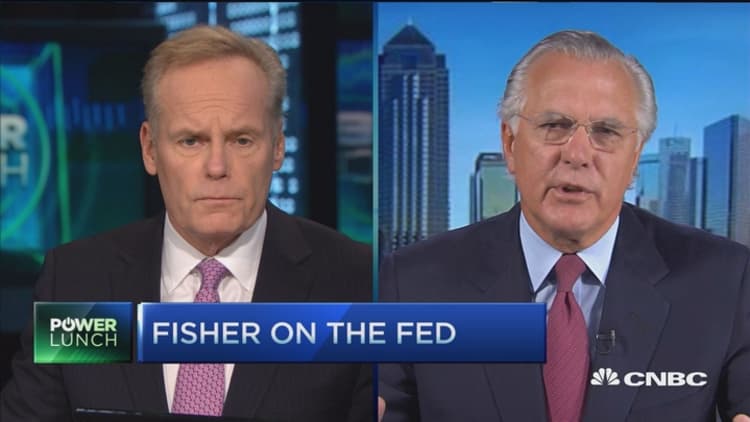
The Federal Open Market Committee recently decided to hold the line on rates, but while market watchers are concerned about the Federal Reserve's tightening pace, a former central bank official says there is something else that's important.
FOMC voting member and Fed Vice Chair Stanley Fischer early on Monday reiterated the decision to continue eyeing global economic conditions, adding that the central bank is unsure of how many times it'll raise interest rates this year.
Soon after, Richard Fisher, former president and CEO of the Federal Reserve Bank of Dallas, told CNBC's "Power Lunch" that one of the most important thing that Fischer mentioned is the reinvestment of maturing securities in the Fed's System Open Market Account portfolio.
According to the Federal Reserve Bank of New York, the managing bank of the portfolio, SOMA is a domestic portfolio that involves "U.S. Treasury and federal agency securities held on both an outright and a temporary basis. The SOMA foreign currency portfolio is made up of investments denominated in euros and yen."
Fisher contends that the data in the SOMA portfolio have an important influence on the fixed income market and other markets as a result.
"This year, 2016, $216 billion of Treasurys will mature in the portfolio, between now and 2019, $1.1 trillion," Fisher said. He added that two years ago the number for maturity was $470 million, last year $3.5 billion and by 2019 it'll be $1.9 trillion.
Fisher thinks that "this [information] is important ... because as long as [the Fed] reinvests those proceeds, monetary policy maintains their balance sheet at $2.5 trillion in terms of these securities held," he said, adding that the fail rate on Treasurys has gone up to 2.5 percent in comparison to its normal 1 percent.
In the scenario of a Fed rollover, however, on-the-run issues come into play, Fisher said.
"That will alleviate some of the problems you have in terms of fails in the Treasury market, and some of the complaints that have been running through the market that liquidity is restrained even in the Treasurys," he said.
The yield on the U.S. 10-year Treasury was at 1.96 percent, and the was at 0.80 percent in late trading Monday.
— CNBC's Jacob Pramuk contributed to this report.




